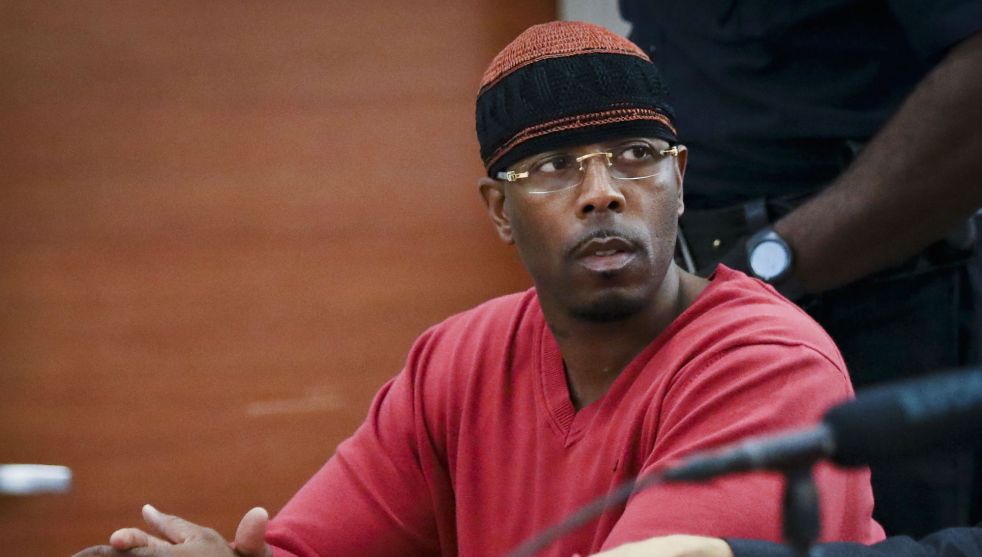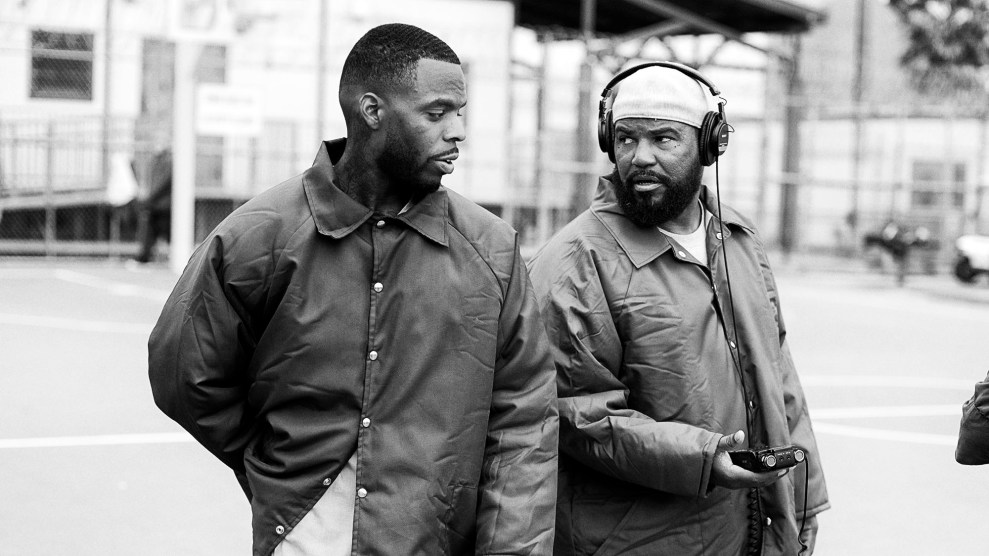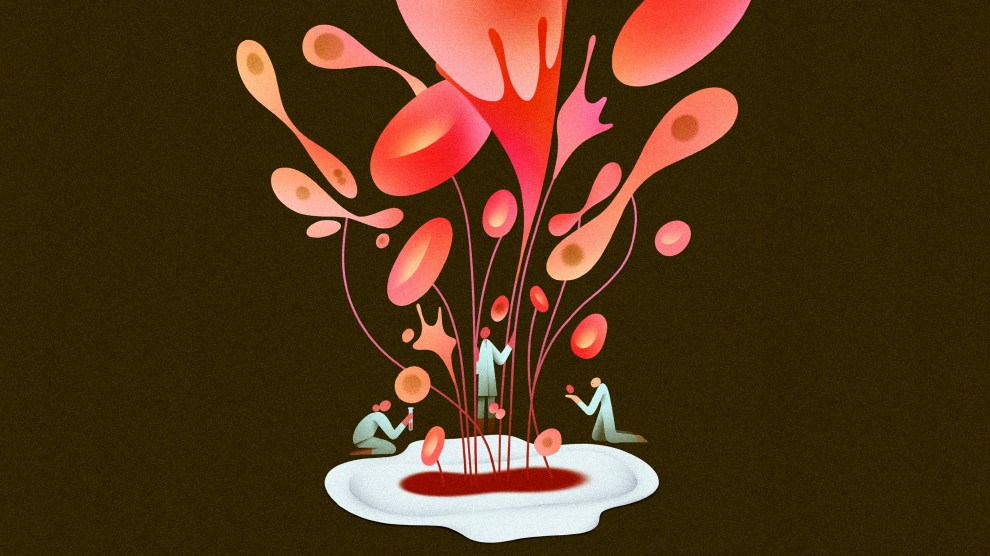
Calvin Buari, the subject of the new podcast Empire on Blood, at a hearing in Bronx Criminal Court in May 2017.Bebeto Matthews/AP Photo
Seven years ago, Steve Fishman began looking into the story of Calvin “Cal” Buari, a New York prison inmate who insisted he didn’t commit the murder of two brothers for which he had been sentenced to 50 years to life. Initially, Fishman, a contributing editor at New York magazine, was skeptical. “He might be innocent, but I don’t have the time,” Fishman remembers thinking. But he kept taking Buari’s calls, and was slowly drawn in by “this guy running a campaign for his freedom from a prison payphone.”
By 2015, Fishman was convinced that Buari had been unfairly convicted. He says he pitched Buari’s story to his editors “five different ways.” But it was a tough sell. Before Buari was sent to prison in 1995, he had been a powerful crack dealer. His Bronx street corner was known as “the corner on blood.” As Fishman says, “He’s not the kind of guy that society necessarily roots for.”
Fishman’s obsession with the story has culminated in the new investigative podcast series Empire on Blood, which follows Buari’s tireless efforts to overturn his conviction. Along the way, Fishman uncovers new eyewitnesses and hangs out with a key witness who changes his story once, twice, and then a third time, building toward Buari’s ultimate vindication. (The ending isn’t a secret, but if you want to heighten your suspense, don’t read about the major development in Buari’s case that took place last week.)
“I find I like people, and I relate to them,” says Fishman, who interviewed scammer Bernie Madoff for his previous true-crime podcast Ponzi Supernova. “And I relate to them even knowing that they’ve done bad things.” Mother Jones spoke with him about what Buari’s case taught him about the criminal justice system and how he walked the line between journalism, friendship, and advocacy. Warning: Spoilers ahead.
Mother Jones: How did you find Cal Buari and decide you wanted to either write about his story or make a podcast about it?
Steve Fishman: I had been introduced to him by a wrongfully convicted guy that I knew. He said to me, “This guy, Cal Buari, I think he’s innocent, too.” So, one day I’m at home, it’s the evening, and the phone rings. And as you hear in the podcast, Cal kind of launches into this rundown of his case, and the wrong that’s been done, and the missing files, and the witnesses who lied. It’s just all too much. The case sounds complicated. It sounds like he might be innocent. He might be right, but I don’t have the time.
What finally kind of gets to me is there is something in Cal’s voice. It’s a blend of desperation and patience. He’s standing at a prison payphone shouting to me, a stranger, that he needs help. It was this incredibly compelling muted despair. So, I told Cal, “Okay. I’ll take a look. Send me the transcripts.” Then it arrived, and it’s like 1,100 pages. I read it and I said, “Wow. This is some kind of crazy interpretation of the criminal justice system.” It made me open to Cal’s story. It certainly didn’t convince me, but it made me open.
And so, I started taking Cal’s calls. And I started assembling files. I started reaching out to people. It was a slow build. That was in 2011. It was when Cal was in the 15th year of his sentence. I followed this [case] for seven years and watched it wind its way through the criminal justice system.
MJ: Was there a point at which you were all-in on following this story? A turning point?
SF: There actually was a turning point. What you need to know about Cal is that Cal was a drug dealer. He was a very good drug dealer. He was very entrepreneurial and very clever. He was one of the people who brought crack to the Bronx. And he made a lot of money doing that. So, Cal is no angel. He’s not the kind of guy that society necessarily roots for.
But Cal kept calling, and I kept taking the calls, because in my mind, there’s this image of this guy running a campaign for his freedom from a prison payphone. And I just don’t feel like I can hang up on that guy, even though, for at least four years, there didn’t seem to be any forward momentum.
I went back and forth [on whether I thought he was innocent]. But what really turns me around, and what really becomes the moment that I believe in Cal, and that I am okay really committing to this case, is when we sit down with these sisters. And in particular, the younger one, who was at that point 40 years old. At the time of the crime, she was a pregnant 17-year-old girl sitting on the stoop 25 feet from the murder. She’s on the sidewalk. The killer walks down the sidewalk, stops at the passenger side back door of the car, a BMW, and opens fire. And she’s there, and she sees it. And she tells me Cal did not do it.
And that is always the moment that I return to whenever I have doubt. Whenever Cal’s story seems a little too good to be true, whenever the possibility of doubt poses itself and grows and creeps, I picture that woman, sitting as a 17-year-old girl, and I rehear her telling me the story. And she talks about it in just vivid detail. What it’s like to hear the gun go off, and how she reacted. Where she ran. I just felt she was credible. And at that moment I felt, “Oh, my god. Cal’s telling the truth.” Here’s this woman who has been a mystery all these years, and here she is.
MJ: You spent a lot of time talking to lawyers on both sides of this case. What did you learn about the way that prosecutors and defense attorneys do their work in these kinds of criminal cases?
SF: The courtroom is not an arena where there is a search for truth. It’s an arena where two sides come with their own versions of the truth. And they match them against one another, and the guy who tells the better story, who can bolster it with the better evidence, who can appeal to jurors in a way that makes his case seem credible, that’s the guy who prevails.
MJ: We don’t hear from the families of the victims of the murder. I was wondering if that was a conscious decision. What was your thinking?
SF: We really wanted to have the families in there, but unfortunately, the murder was 26 years ago now. And the parents are dead. We looked hard for them. Their voices are not in it. I think that’s too bad. [The brothers] are real people who were slaughtered that night. You have to understand also, that these two guys were murders 33 and 34 in that one precinct that year. There were like 2,000 murders in New York City that year. People don’t remember, because murders are now like 15 percent of what they were back then. It was a very dangerous place. So, the murder of the brothers becomes somehow emblematic of those times.
MJ: By the end of the series, it comes through that you and Cal have become pretty close. How did you navigate that relationship over the years?
SF: That goes deep into the journalistic project. I find I like people, and I relate to them. And I relate to them even knowing that they’ve done bad things. I have talent for gullibility. I find my ability to suspend judgment pretty robust. So, I could be Cal’s friend and I could at the same time feel like there’s a story that I’m doing and a story that I’m loyal to. It meant that for a long time I withheld judgment. It also meant that I needed to be there as the story unfolded.
I mean, I liked Cal. We had lots and lots of conversations. My girlfriend at the time thought Cal and I spoke more than she and I spoke. You hear in the podcast, we trade recipes on cold remedies. He describes what his cell looks like. He tells me about his morning routine. He talks to me about his wife, the woman he married in prison. And he talks to me about how awful prison is. For me, it was impossible not to be sympathetic to the terrible conditions he was in.
This is all to say that in some ways, for me, and maybe for other journalists, there is a way to be friends with a subject, and to have feelings about that subject as a human being that are separate and coexist with your feelings about them as a subject in a story.
MJ: As you reported the story, you got very involved in the case.
SF: I would always give Cal the credit for getting himself free. He is unbelievably persistent.
I think my role, in many ways, was as a connector, as a facilitator. I was the first person to interview the new eyewitnesses. I think I gave him some credibility, because they were credible to me. I did uncover some witnesses who eventually gave affidavits that people who testified at the first trial had lied. So there are lots of things that my presence did. And certainly, if you’re an official knowing that the media is looking closely and following the case, it has a different weight than if it’s a very obscure case.
MJ: Do you feel like you got more involved as a connector once you were convinced that Cal was innocent?
SF: Oh, yeah. The case was just dying until those eyewitnesses, and then it has momentum. Listen, you’re always negotiating this role as an objective journalist, and as an advocate, or a helper, or somebody who’s involved in the case. That was always a straddle for me. But I have to say, at the point that I was convinced that these two new eyewitnesses really had a story to tell that shed light on this drama, at that point, I really felt, “You know what? This guy might really be in prison for a crime he didn’t commit.” And at that point, I felt like the stakes were too high for me to stand behind the curtain and say, “I can’t get involved.”
MJ: Now that Cal is free and the case against him has been dropped, how is he doing?
SF: Cal is a bit of a force of nature. He started a business, and he’s transporting families and friends of inmates to and from prisons in a van. He’s doing well enough that he just somehow got ahold of a second van. Now he calls himself the Uber of the prison transport business. Cal walks into the prison where he spent the last decade, and he gives [his business card] to the corrections officers who guarded him. It’s almost an unimaginable scene to me where these same guys who had shut the bars behind him and considered him an enormously dangerous person are now passing out Cal’s business cards to people who might need a ride to prison.
This interview has been edited and condensed for clarity.















